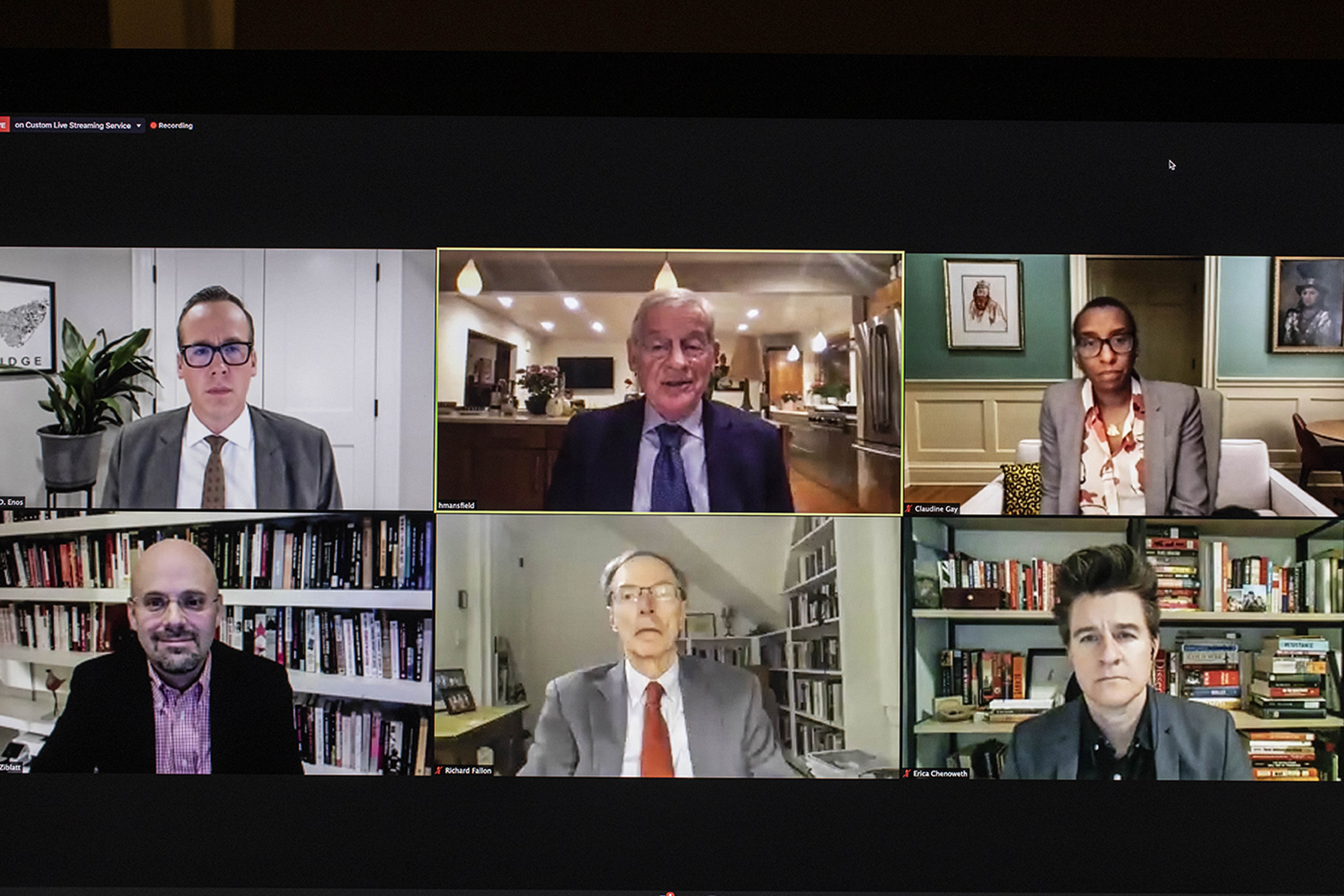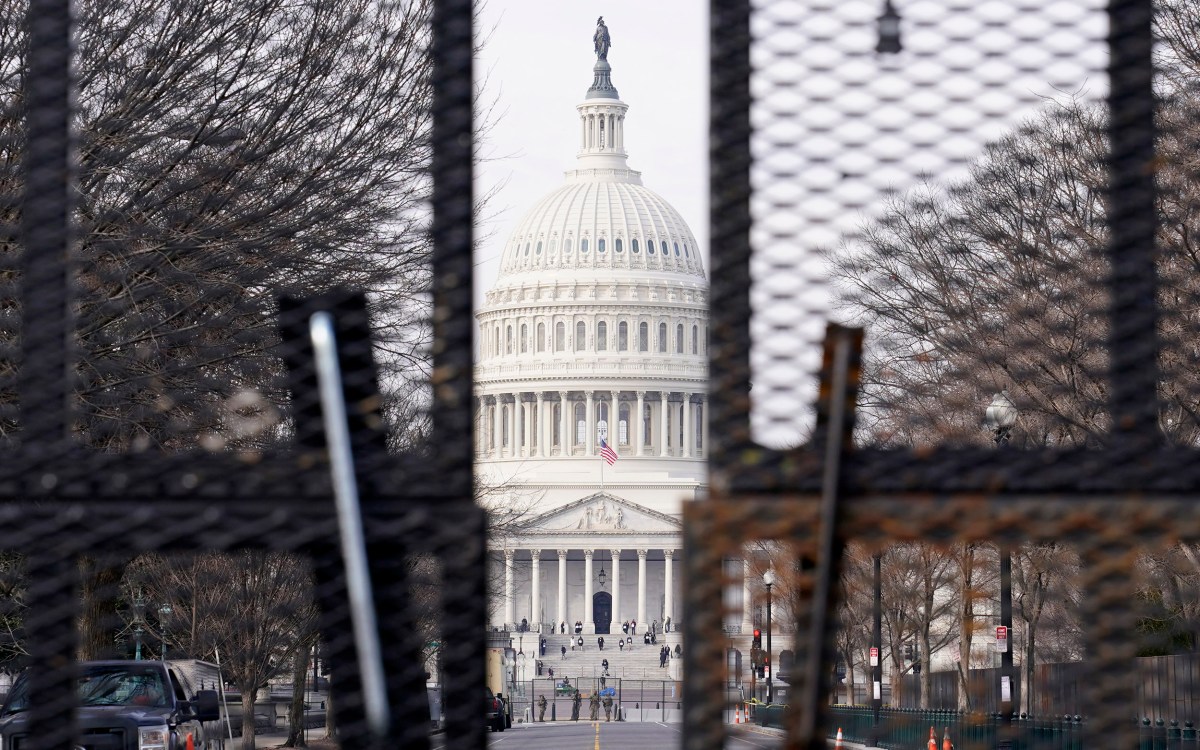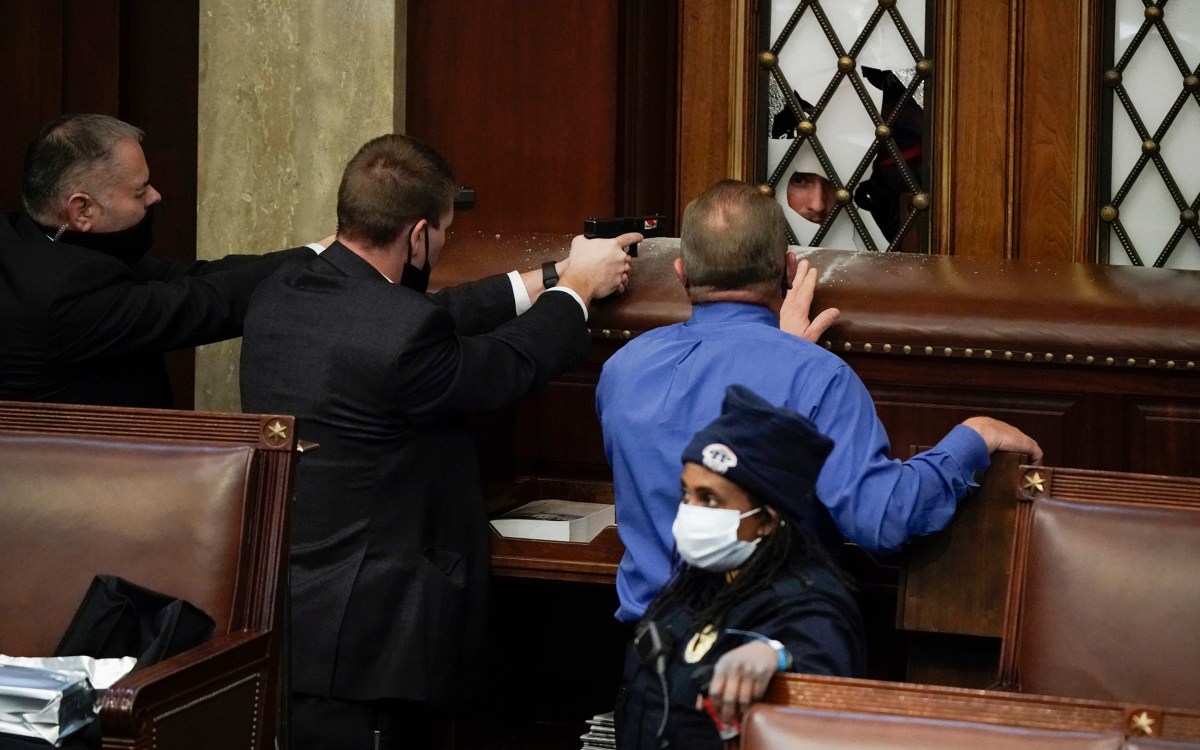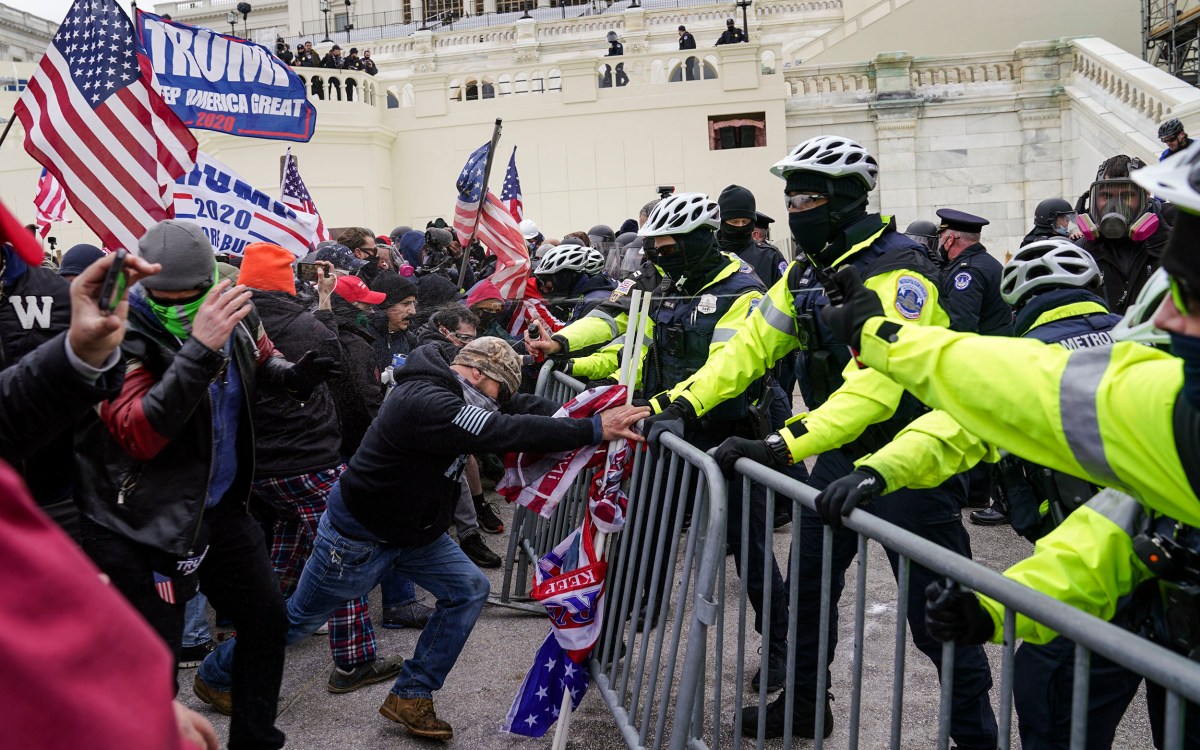
“The Events of January 6 and the Future of American Democracy” was moderated by Ryan Enow (clockwise from upper left), and included Harvey Mansfield, Claudine Gay, Erica Chenoweth, Richard Fallon, and Daniel Ziblatt.
Rose Lincoln/Harvard Staff Photographer
Capitol losses
A Harvard panel assesses the damage done by the Jan. 6 riots
Three weeks after a mob of Trump supporters and white supremacists broke into the Capitol to protest Congress’ formal counting of the Electoral College votes, a Harvard panel of experts soberly reflected on the critical damage done to democracy and the arduous work ahead to figure out how to save it.
The toll of the Jan. 6 riot that left five people dead and 140 police officers injured is still being measured, but faculty across the University gave a stark assessment of the harm done to the country’s foundation by both insurrectionists and politicians.
At a virtual gathering titled “The Events of January 6 and the Future of American Democracy,” Erica Chenoweth, Berthold Beitz Professor in Human Rights and International Affairs at the Harvard Kennedy School and Susan S. and Kenneth L. Wallach Professor at the Radcliffe Institute for Advanced Study, compared the attempted coup to Adolf Hitler’s failed takeover in Bavaria in 1923 and the seeding of anti-government conspiracy that followed. She castigated the people in Congress who perpetuated the false claim that the election had been stolen from former President Donald Trump even after the insurrection.
“l don’t want to be accused of being overly alarmist at any point, but there are historical examples we can avoid if we take very seriously this pattern of behavior and stand up for the truth, and absolutely reject people who are in power and authority and who want to challenge and destroy the truth. We should have our elected officials standing up for the rule of law or demanding that they resign,” she said.
Daniel Ziblatt, Eaton Professor of the Science of Government and co-author of “How Democracies Die,” called the riot “remarkable and consequential,” despite data that shows an established, wealthy democracy like the U.S. should be safe from breaking down.
“That should be reassuring, but if any of you are like me, it’s not entirely reassuring,” he said. “The point here, though, is one of the key hinges: What happens with the Republican Party? We have a two-party system. If one of the parties doesn’t behave in ways that respect the basic rules of the democratic game, it’s really hard to imagine this lasting very long.”
“It’s a difficult thing when a demagogue hijacks your party. It is true that, on the one hand, Republicans enabled Donald Trump but, on the other hand, he enabled them.”
Harvey Mansfield
The panel gathered as part of the Office for the Vice Provost’s Socialize Remotely series. In the 90-minute webinar moderated by Ryan D. Enos, professor of government and faculty associate in the Institute for Quantitative Social Science; Edgerley Family Dean of the Faculty of Arts and Sciences Claudine Gay; Harvey Mansfield, William R. Kenan Jr. Professor of Government; and Richard Fallon, Story Professor of Law at Harvard Law School and an affiliate professor in government, also spoke in grave terms about what led to the riot and theorized about what it will take for country to move forward.
Fallon said that the outdated Electoral College voting system is a hindrance to democracy, and, “There’s not as much help coming from the Constitution as you might hope for.
“If we escaped disaster on Jan. 6, it is not because the structures of democracy that the Constitution creates provide anything like a failsafe. To the contrary, many aspects of our system are ill-designed to meet current challenges. Right now our political culture is in shambles, but if our future is to be rescued, the rescues will have to come through the reform of our politic that the Constitution does not require and in some cases may inhibit,” he said.
Gay offered a positive view of the power of an expanding electorate that “demands to be represented in government.” She noted the record turnout for the presidential election, 67 percent, was the highest in more than 120 years, and that 76,000 new voters registered in Georgia for the Senate election runoff after Election Day.
“This was not magic, but rather the culmination of years of really deep organizing and grassroots mobilization by advocacy groups such as the New Georgia Project, which registered more than 500,000 in just the last six years,” she said. “As I look ahead, that’s the dynamic that gives me hope. Our democracy — however imperfect, which it is — I firmly believe is made better the more we all participate.”
In his remarks, Mansfield classified Trump as a demagogue whose vulgarity and coarseness appeal to the worst instincts of “followers more interesting to study than him,” and explained the GOP’s inability to break from him this way:
“It’s a difficult thing when a demagogue hijacks your party. It is true that, on the one hand, Republicans enabled Donald Trump but, on the other hand, he enabled them. He wasn’t able to make deals with Democrats and Republicans because, from the beginning, he faced a mode of resistance. He was, therefore, constrained to follow a policy program of pretty normal Republican things — tax cuts, deregulation, somewhat stronger foreign policy,” he said.
But the GOP enabling, compounded by media that continues to advance false election narratives, left Gay “to confess that so much of what is unfolding right now goes so far beyond what scholars of American politics are used to talking about.”
“It’s not just about the outrage of trying to throw out millions of legally cast ballots. … It’s using what were previously innocuous and procedural milestones in the election certification process as now strategic choke points,” she said. “I wish I had a more optimistic view on that particular issue, but it says something that demonstrably false claims meant to undermine public trust in our electoral process and rejected by nearly 60 courts are still being treated as political perspectives that are worth defending. This isn’t ordinary political and policy disagreement.”
In her closing response to Enos’ final question to the group — what actions can be taken? — she said (and Mansfield echoed): “Vote.” Both Fallon and Chenoweth, whose new book, “Civil Resistance: What Everyone Needs to Know,” publishes next month, recommended engaging in local politics. Ziblatt gave a nod to the many who engaged in the political process as part of their jobs.
“The thing that really saved us, if not our checks and balances, were people doing their jobs … journalists, civil servants, military officers, Capitol Hill police officers, abiding by professional ethics,” he said. “It turns out that’s the thing that really helps save our democracy.”








